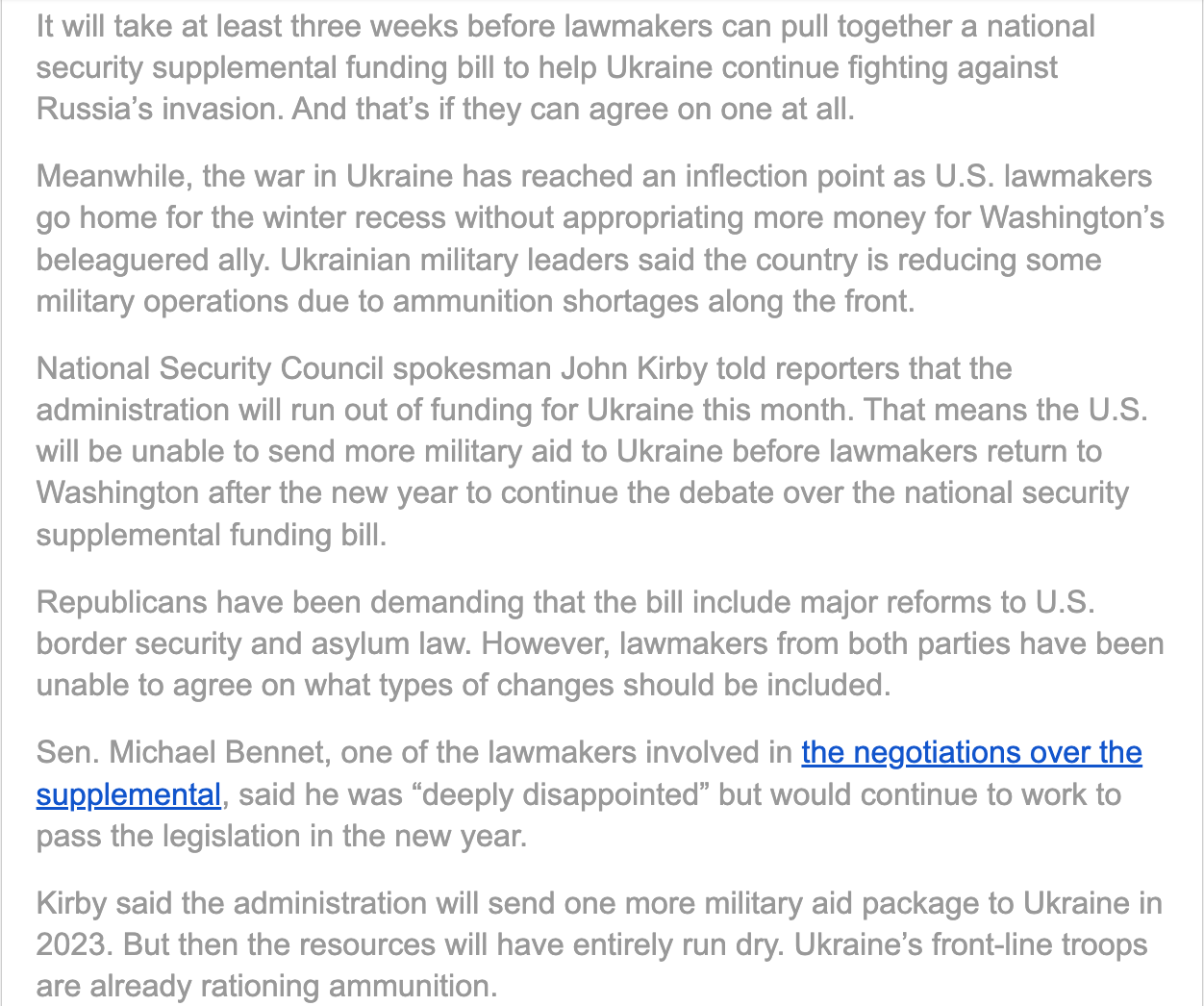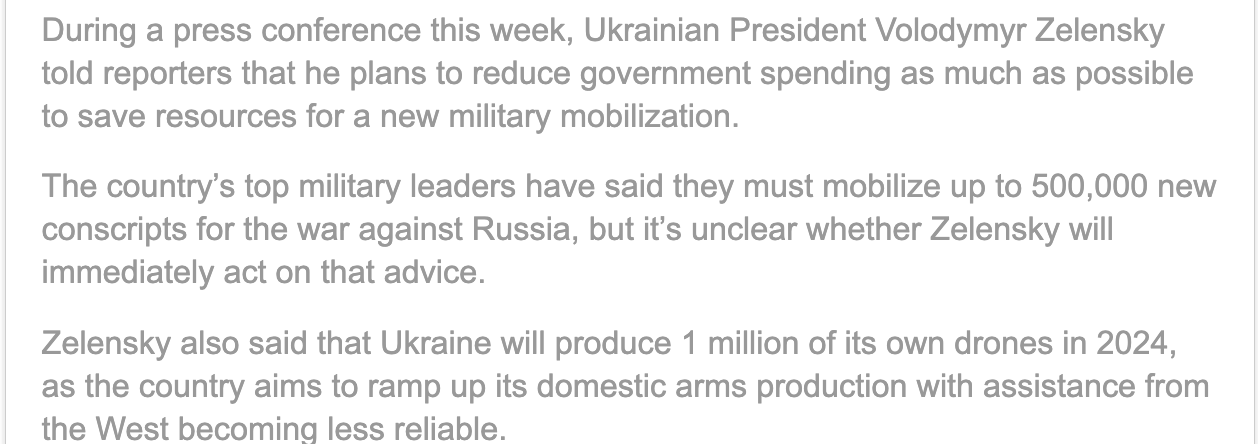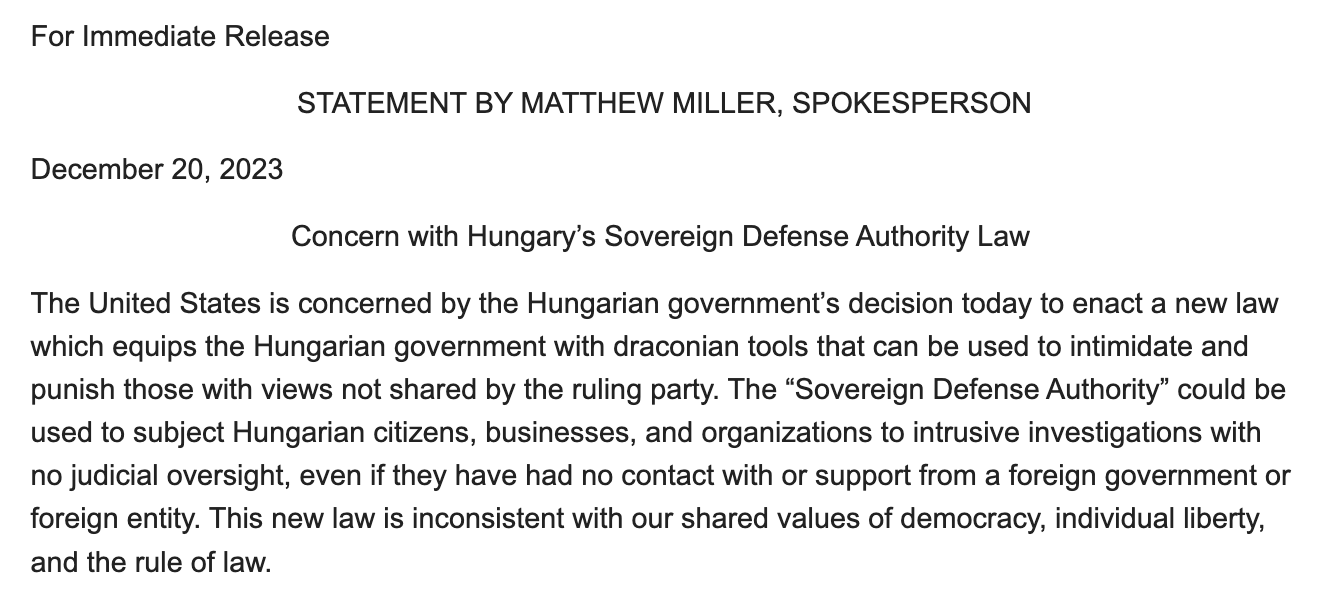The holidays and new year are almost upon us. I’ve decided not to travel this holiday season. I plan to stay home and cook for my family instead. I even obtained a vegetarian tofurky ham roast, so please imagine me baking a “ham” and blasting Handel’s Messiah like my American grandmother did every Christmas. I don’t consider myself a Christian, but some habits die hard, and the music is excellent.
This newsletter will be taking a break until the new year. I’ll be back Sunday, January 7. That’s one day before Republicans on Capitol Hill meet to discuss immigration and border policy and, by extension, Ukraine aid.
Meanwhile, I’m still editing new stories for Lazo Magazine. This week, the Colombia-based anthropologist and writer Rowan Glass explores how centuries of colonialism, forced assimilation, conflict, and now tourism and multinational capitalism have influenced indigenous communities in the remote Sibundoy Valley.
This journalism is possible thanks to the support of George Mason University’s Mercatus Center and its Pluralism and Civil Exchange program.
“Wakhtán,” came the customary greeting in the Kamëntšá language as I entered the house of Batá Margarita Chicunque, 80. Margarita is one of the most highly respected artisans in Sibundoy, locally renowned for her mastery of weaving.
I had come to pick up a capisayo, a ceremonial poncho, which I had commissioned in the traditional style.
Margarita waved me into her home with a smile that showed the gaps in her teeth. I sat to watch as she put the finishing touches on her work.
Margarita’s hands seemed to move automatically, drawing the fibers together, interweaving red threads with blue, white, and black — the traditional colors of the Kamëntšá. Even as her hands flew across the loom in a series of movements honed by decades of practice, her eyes were on the grainy screen of the antique television, whose light illuminated the narrow confines of her modest workspace.
Keep Reading Lazo Magazine.
If you can afford to support Lazo Magazine this holiday season, either by donating or becoming a paid subscriber of this newsletter, I’d be very grateful. I’ve received dozens of pitches from writers I’d like to commission, but I can only do that with your support! Every dollar counts.
What I’m writing:
• The case of Ryan Corbett, a U.S. aid worker wrongfully detained in Afghanistan, illustrates the U.S. government's limitations when trying to free a citizen from a hostile regime that uses "hostage diplomacy." I wrote about the effort to convince the Taliban to release Ryan. This story is unlocked and free to read.
• Here’s a look at what’s in the 2024 National Defense Authorization Act, which directs the U.S. Defense Department’s policies and spending. The legislation outlines the military’s agenda and authorizes spending for the year but does not appropriate funds. That means Congress must still pass an annual budget. Current funding for the Defense Department will run out on February 2. This story is unlocked and free to read.
My weekly news blurbs:
What I’m reading:

• Russian President Vladimir Putin has been quietly signaling he is open to a cease-fire in Ukraine, the New York Times reports.
• The number of people killed in Gaza surpassed 20,000, according to the Hamas-run health ministry and its government media office. Al Jazeera has the story.
• Israel dropped hundreds of large bombs capable of killing people more than 1,000 feet away in the first month of the war, including hundreds of 2,000-pound bombs, in a high-intensity offensive that “had not been seen since Vietnam,” according to an analysis by CNN.
• Evidence presented by Israel “falls short of showing that Hamas had been using the [Al-Shifa] hospital as a command and control center, according to a Washington Post analysis of open-source visuals, satellite imagery, and all of the publicly released IDF materials.”
• Foreign Policy Magazine has an interesting article on Degrowth Economics and the Degrowth Movement’s recent conference in Croatia.
• A Russian politician calling for peace in Ukraine presented documents to Russia’s Central Election Commission to register as a candidate for the country’s 2024 presidential election, the Associated Press reports.
• Ukrainian General Oleksandr Tarnavaskyi said Ukraine is downsizing some military operations due to ammunition shortages along the “entire front line” and a lack of foreign aid, the BBC reports.
• Business Insider examines whether Andriy Yermak, Ukrainian President Zelensky's right-hand man, is handing war-torn Ukraine over to oligarchs.
• A false rumor that Ukrainian President Volodymr Zelenskyy used U.S. aid to purchase yachts was picked up by members of the U.S. Congress debating military spending, the BBC reports. Disinformation researchers tracked the rumor to a website run by a former U.S. Marine now living in Russia and said the channels through which it spread were part of a larger pro-Russian propaganda campaign.
• Ukraine’s Deputy Prime Minister said his country hopes to reach an agreement with the new Polish government this week to end the truck blockades at the Ukrainian border, Reuters reports.
• Serbian President Aleksandar Vučić looks set to tighten his grip on power, Politico Europe reports. But, the government is facing accusations of significant irregularities during the election.
• Serbian President Aleksandar Vučić claimed victory with a 47% vote share in a snap parliamentary election, the BBC reports. Opposition parties called for a protest, claiming electrical fraud favoring the government.
• The U.S. will be able to base soldiers and equipment permanently in Denmark after the Scandinavian country reversed decades of foreign policy to become the last nation in the region to sign a defense cooperation agreement with Washington, the Financial Times reports.
• Russia summoned Finland’s ambassador in objection to a defense agreement giving the U.S. access to the newest NATO member, Reuters reports.
• Turkey’s acceptance of Sweden’s NATO accession is contingent upon the U.S. approving Ankara’s request to purchase F-16 fighter jets, Turkish President Recep Tayyip Erdoğan said after returning from Hungary. The Associated Press has the story.
• A gunman shot 14 people dead and injured a further 25 at Charles University in Prague, marking the most fatal attack in modern Czech history, the BBC reports.
• Poland’s new parliament debated changes to state media impartiality, following concerns by critics that it became politicized and biased under the previous government, Reuters reports.
• Poland’s main public television channel went dark after supporters of the former right-wing Law and Justice government took over the channel’s headquarters, the New York Times reports.
• The far-right Alternative for Germany (AfD) won its first mayoral election in Saxony just days after the party was officially labeled “extremist” by the country’s intelligence services for anti-migrant rhetoric and attempts to undermine democracy, the BBC reports.
• Germany signed an agreement to permanently deploy 4,800 German troops in Lithuania following Russian aggression against Ukraine, the Kyiv Independent reports. It will be the first German military base abroad since the end of the Second World War.
• The French parliament passed new controversial legislation tightening immigration policy, which far-right National Rally leader Marine Le Pen labeled as an “ideological victory” for her party, the BBC reports.
• The United Kingdom’s Home Office made a U-turn on its much-criticized plan to imminently raise the minimum salary requirement for British nationals bringing foreign family members to the UK, saying the threshold will first be raised to £29,000 instead of £38,700, the Guardian reports.
• European Union leaders announced they had reached an agreement on the key elements of the Pact on Asylum and Migration, intended to revamp migration management in response to increasing arrivals, NPR reports. Rights groups and others criticized the deal – which still requires approval once the full text is finalized – as weakening the rights of asylum seekers.
• Germany’s Foreign Minister Annalena Baerbock called for a “sustainable cease-fire” in Gaza in a joint article in the Times of London with her British counterpart David Cameron. “The sooner it comes, the better — the need is urgent,” they wrote.
• Israel will gradually move to the next phase in the war, Defense Minister Yoav Gallant said, following talks with U.S. officials on moving to lower-intensity combat, Reuters reports.
• Questions of Israel’s pre-war Hamas intelligence were raised after the Israeli military said it discovered the largest tunnel in Gaza, which facilitated the transit of militants, equipment, and vehicles just a few hundred yards away from the nearby Israeli military base and fortified Erez crossing. The Wall Street Journal has more.
• Hamas engaged in discussions with its Palestinian rivals Fatah, the dominant faction of the Palestinian Authority in the West Bank, on plans for a post-war Gaza and West Bank, the Wall Street Journal reports.
• Chile rejected a new constitution proposed by conservative delegates that would have changed laws on abortion access, the right to strike, and the rights of indigenous people, the BBC reports. The draft constitution was rejected on a 56% vote share.
• The United States and Venezuela reached a prisoner swap agreement, brokered by Qatar, in which the United States released Colombian businessman Alex Saab, a close ally of Venezuelan President Nicolás Maduro, and in exchange received ten jailed Americans and notorious defense contractor Leonard Francis, known as a “Fat Leonard,” who had been wanted for his role in a large U.S. Navy corruption scandal. The New York Times has the story.
• Argentina’s new President, Javier Milei, signed a decree with radical economic reforms seeking to deregulate the country’s economy. Among the measures are an end to limits on exports, plans to privatize state-owned companies, and loosened protections for renters, employees, and shoppers. The Associated Press has more.
• More than 100 Members of Parliament were suspended from India’s parliament in a move the opposition calls ‘a complete purge,’ Al Jazeera reports.
• In heavily guarded compounds controlled by local warlords in Myanmar, tens of thousands of people, mainly Chinese, have been trapped and forced by criminal gangs to defraud strangers with sophisticated schemes over the internet, CNN reports.
• OpenDemocracy profiles one man’s journey across North Africa after fleeing war in Sudan and his determination to reach Europe.
• Up to 300,000 people in Sudan fled their homes from Wad Medani, what was once a safe province, due to the fighting between Sudan’s military and the paramilitary Rapid Support Forces (RSF). ABC has the story.
Interesting statements:
You can write to me for any reason: c.maza@protonmail.com









